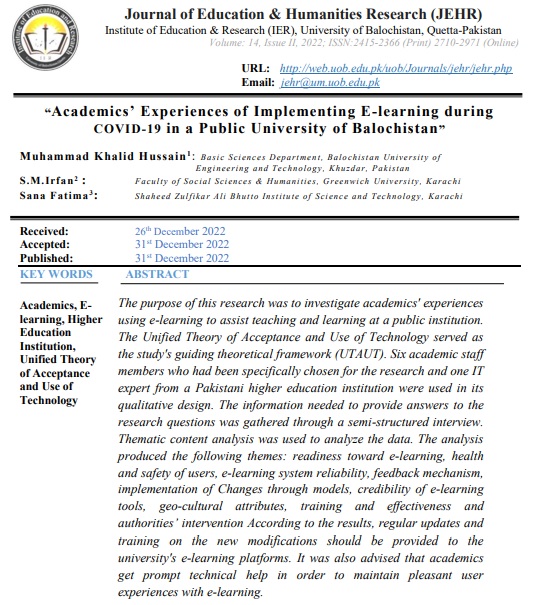Academics’ Experiences of Implementing E-learning during COVID-19 in a Public University of Balochistan
Keywords:
Academics, E-learning, Higher Education Institution, Unified Theory of Acceptance and Use of TechnologyAbstract
The purpose of this research was to investigate academics' experiences using e-learning to assist teaching and learning at a public institution. The Unified Theory of Acceptance and Use of Technology served as the study's guiding theoretical framework (UTAUT). Six academic staff members who had been specifically chosen for the research and one IT expert from a Pakistani higher education institution were used in its qualitative design. The information needed to provide answers to the research questions was gathered through a semi-structured interview. Thematic content analysis was used to analyze the data. The analysis produced the following themes: readiness toward e-learning, health and safety of users, e-learning system reliability, feedback mechanism, implementation of Changes through models, credibility of e-learning tools,geo-cultural attributes, training and effectiveness and authrities’ intervention According to the results, regular updates and training on the new modifications should be provided to the university's e-learning platforms. It was also advised that academics get prompt technical help in order to maintain pleasant user experiences with e-learning.
References
Almaiah, M. A., Al-Khasawneh, A., & Althunibat, A. (2020). Exploring the critical challenges and factors influencing the E-learning system usage during COVID-19 pandemic. Education and information technologies, 25(6), 5261-5280.
Aldowah, H., Ghazal, S., & Umar, I. (2018). INSTRUCTORS'CHALLENGES IN IMPLEMENTING E-LEARNING IN A PUBLIC UNIVERSITY IN YEMEN. The Turkish Online Journal of Design, Art and Communication, 1138-1146.
Barge, P. (2013). Developing a Knowledge Management Model for student support services in eLearning Courses.
Flynn, S., & Noonan, G. (2020). Mind the gap: Academic staff experiences of remote teaching during the Covid 19 emergency. All Ireland Journal of Higher Education, 12(3).
Haron, H.,&Sahar, S. (2010). An investigation on predictors of e-learning adoption among Malaysian elearners. In Science and social research (cssr), 2010 international conference on (pp. 927–932).
Islam, N., Beer, M., & Slack, F. (2015). E-learning challenges faced by academics in higher education. Journal of Education and Training Studies, 3(5), 102-112.
Kumar, J. A., & Al-Samarraie, H. (2018). MOOCs in the Malaysian higher education institutions: the instructors’ perspectives. The Reference Librarian, 1-15. https://doi.org/10.1080/02763877.2018.1458688
Rapanta, C., Botturi, L., Goodyear, P., Guàrdia, L., & Koole, M. (2020). Online university teaching during and after the Covid-19 crisis: Refocusing teacher presence and learning activity. Postdigital science and education, 2(3), 923-945.
Maphalala, M. C., & Adigun, O. T. (2021). Academics' Experience of Implementing E-Learning in a South African Higher Education Institution. International Journal of Higher Education, 10(1), 1-13.
Mahabeer, P. & Pirtheepal, T. (2019). Online formative assessment tools: lecturers’ experiences of using Moodle at a university in South Africa. Journal of Educational Studies, 18 (1), 43-63. Retrieved from https://journals.co.za/content/journal/10520/EJC-1d876408e3
Maphalala, M. C., & Mpofu, N. (2018). Exploring the e-learning experiences of academic staff at a South African University. Progressio, 40(1), 1-18.
Marchewka, J. T., & Kostiwa, K. (2007). An application of the UTAUT model for understanding student perceptions using course management software. Communications of the IIMA, 7(2), 10.
Noesgaard, S. S., & Ørngreen, R. (2015). The Effectiveness of E Learning: An Explorative and Integrative Review of the Definitions, Methodologies and Factors that Promote e Learning Effectiveness. Electronic Journal of E-learning, 13(4), pp277-289.
Salih, S. K., & Taniwall, N. J. (2020). Issues and challenges of E-learning system Adoption in a public university of Afghanistan: a case study of shaikh zayed university. J. Human. Soc. Sci.(IOSR-JHSS), 25(1), 63-69.
Sackstein, S., Coleman, E. & Ndobe, T. V. (2019). Lecturers' perceptions of learning management systems within a previously disadvantaged university. In Opening Up Education for Inclusivity Across Digital Economies and Societies (pp. 1-28). IGI Global. https://doi.org/10.4018/978-1-5225-7473-6.ch001
Williams, M. D., Rana, N. P., & Dwivedi, Y. K. (2015). The unified theory of acceptance and use of technology .




